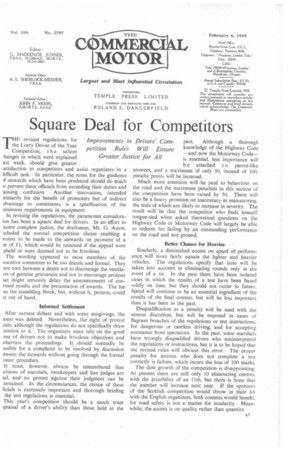Square Deal for Competitors T HE revised regulations for the Lorry
Page 37

If you've noticed an error in this article please click here to report it so we can fix it.
Driver of the Year Competition, t h e salient ;hanges in which were explained ast week, should give greater atisfaction to competitors and assist organizers in a lifficult task. In particular, the notes for the guidance stewards which have been produced should do much o prevent these officials from exceeding their duties and ausing confusion. Another innovation, intended rimarily for the benefit of promoters but of indirect dvantage to contestants, is a specification of the ninimum requirements in equipment.
In revising the regulations, the paramount consideraion has been a square deal for drivers. In an effort to nsure complete justice, the draftsman, Mr. G. Aston, icluded the normal competition clause enabling a ■ rotest to be made to the stewards on payment of a !e of £1, which would be returned if the appeal were pheld or were deemed not to be frivolous.
The wording appeared to most members of the xecutive committee to be too drastic and formal. They 'ere torn between a desire not to discourage the ventilaon of genuine grievances and not to encourage protests iat might seriously delay the announcement of conrmed results and the presentation of awards. The fee as the stumbling block, but, without it, protests could t out of hand.
Informal Settlement After earnest debate and with some misgivings, the ause was deleted. Nevertheless, the right of protest cists, although the regulations do not specifically draw tentiov to it. The organizers must rely on the good nse of drivers not to make frivolous objections and nbarrass the proceedings. It should normally be nsible for a complaint to be resolved by discussion Aween the stewards without going through the formal .otest procedure.
It must, however, always be remembered that :cisions of marshals, timekeepers and line judges are ial, and no protest against their judgment can be tertained. In the circumstances, the choice of these ficials is extremely important and thorough briefing the test regulations is essential.
This year's competition should be a much truer Ipraisal of a driver's ability than those held in the past, Although a thorough knowledge of the Highway Code —and now the Motorway Code— is essential, less importance will be attached to parrot-like answers, and a maximum of only 50, instead of 100, penalty points will be incurred.
Much more attention will be paid to behaviour on the road and the maximum penalties in this section of the competition have been raised by 50. There will also be a heavy premium on inaccuracy in manceuvring, the tests of which are likely to increase in severity. The result will be that the competitor, who finds himself tongue-tied when asked theoretical questions on the Highway Code or Motorway Code will largely be able to redeem his failing by an outstanding performance on the road and test ground.
Better Chance for Heavies Similarly, a diminished accent on speed of performance will more fairly equate the lighter and heavier vehicles. The regulations specify that time will be taken into account in eliminating rounds only in the event of a tie. In the past there have been isolated cases in which the results of a test have been based solely on time, but they should not occur in future Speed will continue to be an essential ingredient of the results of the final contest, but will be less important than it has been in the past.
Disqualification as a penalty will be used with the utmost discretion, but will be imposed in cases of flagrant breaches of the regulations or test instructions, for dangerous or careless driving, and for accepting assistance from spectators. In the past, some marshals have wrongly disqualified drivers who misinterpreted the regulations or instructions, but it is to be hoped that the revised rules will obviate this error. The proper penalty for anyone who does not complete a test correctly is failure, which incurs the loss of 100 marks.
The slow growth of the competition is disappointing. At present there are still only 10 eliminating centres. with the possibility of an 1 1 th, but there is hope that the number will increase nextyear. If the sponsors of the Scottish competition would throw in their lot with the English organizers, both contests would benefit, for road safety is not a matter for insularity. Meanwhile, the accent is on quality rather than quantity.




























































































































